Pay-per-click (PPC) advertising is a powerful tool for businesses aiming to boost their online visibility and drive traffic to their websites. A PPC consultant can transform your advertising strategy, ensuring that campaigns are optimized for the best possible return on investment. These experts bring a wealth of experience and strategic insight, helping you manage your budget effectively while improving the performance of your ads.

Working with a PPC consultant means tapping into specialized knowledge that can enhance campaign results significantly. These professionals can tailor strategies to your unique business goals. They can guide you through the complexities of platforms like Google Ads and Facebook, using data-driven insights to adjust and refine your campaigns.
Partnering with a skilled PPC consultant also involves a strategic approach to managing your ads. This includes identifying key performance metrics and implementing ongoing optimization. With their guidance, you can ensure that your advertising efforts are both cost-effective and aligned with your business objectives.
Key Takeaways
- PPC consultants optimize ad strategies for better ROI.
- Tailored PPC approaches align with unique business goals.
- Data-driven methods enhance engagement and conversions.
Understanding PPC
Pay-Per-Click (PPC) is an essential component of digital marketing. It involves paying for advertising space on search engines like Google. This approach can quickly increase your visibility and help reach your target audience more effectively. In contrast, SEO focuses on optimizing content to rank organically. The following sections will delve into these aspects further.
Fundamentals of PPC
PPC is a model of internet marketing where you, as an advertiser, pay a fee each time one of your ads is clicked. Essentially, it’s a way of buying visits to your site, rather than attempting to “earn” those visits through organic means. The most popular form of PPC is search engine advertising. Advertisers bid for ad placement in a search engine’s sponsored links when someone searches a keyword related to their business.
A successful PPC campaign requires well-researched keywords, engaging ad copy, and strategically planned bids. It allows you to reach your target audience effectively and offers you measurable results with immediate feedback on performance.
Importance of PPC in Digital Marketing
PPC is crucial for any digital marketing strategy due to its immediate impact and scalability. You gain instant visibility on search engines, making it easier to attract potential customers who are actively searching for services like yours. This leads to a higher chance of converting these searches into solid leads or sales compared to other marketing methods.
PPC also provides flexible budgeting, letting you control how much you spend daily. Through platforms like Google Ads, you can adjust campaigns based on real-time performance. The return on investment can be substantial when campaigns are run effectively, offering a robust complement to SEO.
Differences Between PPC and SEO
While PPC and SEO are both strategies to improve your website’s visibility, they have distinct differences. PPC provides immediate results but requires ongoing investment. In contrast, SEO focuses on organically enhancing your site’s ranking, which can take longer to show results but is free once properly optimized.
PPC ads appear at the top of search engine results, above organic listings. With PPC, you pay per click, whereas SEO involves optimizing your site and content to naturally rank higher. Both strategies should be considered and can work together to maximize digital marketing success.
Key Components of PPC
Understanding the key components of PPC helps you create campaigns that are both effective and efficient. Focusing on the right keywords, crafting compelling ad copy, and optimizing landing pages are crucial for success.
Keyword Research and Selection
Keyword research is essential in PPC because it targets the right audience. Start by identifying words and phrases people use when searching for your products or services. Tools like Google Keyword Planner can help find relevant keywords.
Choose a mix of broad, exact, and phrase match keywords to balance reach and precision. Monitor performance to refine your selection. Using negative keywords is also important to filter out irrelevant traffic, saving money and improving ad performance. This strategic approach increases visibility and boosts the chances of conversion.
Ad Copy and Creative Strategies
Crafting effective ad copy involves catching the viewer’s attention and encouraging clicks. Focus on highlighting benefits and using strong calls to action. The ad should be clear, concise, and relevant to your chosen keywords.
Unique selling propositions (USPs) differentiate your ad from competitors. A/B testing different versions of your ad can identify which resonates the most with your target audience. Consistently updating and optimizing your ad copy ensures it remains relevant and engaging, leading to higher click-through rates.
Landing Pages and User Experience
Once a user clicks your ad, the landing page plays a crucial role in conversion. Ensure the landing page is closely related to the ad content and offers a seamless user experience. It should load quickly, be mobile-friendly, and have a clear call to action.
Good UX design focuses on easy navigation and clarity. Analyze user behavior to identify any barriers to conversion and make improvements. By aligning your landing pages with the ad intent, you enhance user satisfaction and increase the likelihood of achieving your campaign goals.
PPC Platforms and Ad Networks
When choosing a PPC platform, it’s important to consider the audience you want to reach and the features of each platform. Each network offers unique tools and advantages for targeting and engagement.
Overview of Google Ads
Google Ads is the most popular pay-per-click platform, recognized for its wide reach and robust targeting capabilities. It operates on a bidding system, where your ad’s visibility depends on your bid and Quality Score. You can tailor campaigns to both B2C and B2B audiences, making it highly versatile.
Key features include keyword targeting, ad extensions, and comprehensive analytics. Understanding how to optimize Quality Score can lead to lower costs per click and better ad placements, helping you maximize return on investment.
Exploring Bing and Microsoft Advertising
Bing Ads, now known as Microsoft Advertising, serves a smaller audience compared to Google but reaches a unique segment of internet users. It offers a competitive edge with typically lower cost-per-clicks due to less competition.
Microsoft Advertising provides features like demographic targeting and device-specific targeting. These options can be particularly effective for reaching older demographics or users on desktop platforms. The platform’s integration with LinkedIn allows for additional B2B targeting options, complementing its existing capabilities.
Social Media Advertising Channels
Social media platforms offer diverse PPC opportunities through channels like Facebook Ads and others.
Facebook, along with Instagram, provides advanced targeting options based on user behavior, interests, and demographics. These platforms allow you to create visually engaging ads tailored to specific audiences.
Other platforms like Pinterest, TikTok, and LinkedIn each have distinct user bases, offering avenues to reach different types of audiences effectively. Social media’s interactive nature makes it ideal for increasing brand visibility and driving user engagement through targeted content and personalized experiences.
PPC Strategy and Management
Developing a strong PPC strategy involves setting clear goals, choosing the right keywords, and continuously optimizing campaigns. An effective management and measurement approach ensures that your campaigns perform well and achieve your desired outcomes.
Creating a PPC Strategy Framework
To create a PPC strategy framework, start by defining your advertising goals. Are you looking to increase brand awareness, drive traffic, or boost sales? Once your goals are set, conduct thorough keyword research to find terms that align with your objectives. Tools like Google Keyword Planner can be helpful.
Next, develop ads that speak to your target audience’s needs and motivations. Craft compelling headlines and engaging ad copy. Use ad extensions to provide additional information, such as contact details or site links, to enhance your advertisements.
Regularly review your ad groups for relevance and restructure them if necessary to ensure they match your strategic goals.
PPC Campaign Management & Optimization
Effective PPC campaign management involves monitoring and adjusting your campaigns regularly. Use automation tools to help with bidding, but don’t rely on them completely.
Keep a close eye on your budget and allocate funds to well-performing keywords while pausing or removing underperforming ones.
Optimization should be ongoing. Test different elements like ad copy, landing pages, and bidding strategies to improve results. A/B testing can help identify what works best.
Evaluate the performance of your ads based on metrics such as click-through rate (CTR), conversion rate, and cost per conversion. Adjust your bids and budget according to these results to maximize return on investment.
Analytics and Performance Measurement
Analytics are crucial for measuring the success of your PPC efforts. Utilize platforms like Google Analytics to track user behavior and conversion paths. Set up conversion tracking to understand which ads are driving the desired actions on your site.
Analyze metrics like bounce rate, average session duration, and pages per session to get a holistic view of user engagement. Watch for patterns in your data that could indicate trends or areas for improvement.
Report on key performance indicators (KPIs) to assess progress toward your goals. Regularly review and refine your strategies based on these insights to ensure your PPC campaigns are effective and aligned with your business objectives.
Measuring PPC Success
PPC success is best measured through key performance indicators that highlight conversions and cost-effectiveness. Understanding these metrics ensures that your ad spend is leading to tangible business results.
Understanding Conversion Rates and ROI
Conversion rates are crucial as they demonstrate the percentage of ad clicks that lead to successful actions like purchases or sign-ups. A high conversion rate indicates that your ads are effectively attracting the right audience.
To calculate conversion rates, divide the number of conversions by the total number of ad clicks, then multiply by 100 for a percentage.
ROI, or return on investment, reveals the profitability of your PPC campaigns. It compares net profit with the cost of investment. By evaluating ROI, you can determine whether the revenue generated from your ads justifies the spending.
Advanced Metrics: CPC, CTR, and ROAS
Cost Per Click (CPC) measures how much you pay for each click on your ad. It helps manage your budget by highlighting cost efficiency.
Lower CPC often means you are getting more clicks for less money, which can stretch your marketing dollars further.
Click-Through Rate (CTR) shows the ratio of clicks to impressions, offering insight into ad appeal. A higher CTR suggests that your ad content is engaging to viewers. To calculate CTR, divide the number of clicks by the number of impressions, then multiply by 100 for a percentage.
Return on Ad Spend (ROAS) is vital for assessing the revenue generated per dollar spent on advertising. It is calculated by dividing total revenue by ad spend. A higher ROAS indicates better ad performance and should inform your future campaign strategies.
Leveraging Reporting for PPC Campaigns
Detailed reporting is essential for ongoing PPC success. Utilize analytics tools to track how different metrics like conversions and CTR evolve over time.
Regularly reviewing these reports allows for timely adjustments to campaigns, ensuring that your PPC efforts remain aligned with business goals.
Reports can highlight trends, enabling you to refine target keywords or adjust ad placement. They also help identify which campaigns yield the best ROAS, ensuring that future investments are strategically sound.
Optimization and Advanced Techniques
To optimize your PPC campaigns, you need to focus on strategic bid management, quality score improvement, and smart use of retargeting. These elements work together to boost visibility and effectiveness.
Bid Strategies and Budget Management
Effective bid strategies can significantly impact your PPC success. You have several options, including manual bidding, automated bidding, and enhanced cost-per-click (ECPC). Manual bidding lets you control each ad bid, while automated options use algorithms to adjust bids based on performance.
Budget management is equally critical. Allocate your budget wisely by considering factors such as target audience, peak times, and performance data.
Regularly reviewing your budget helps ensure you’re not overspending or missing key opportunities. Smart allocation can maximize ROI by ensuring funds are spent on high-performing campaigns.
Quality Score and Ad Ranking Factors
Your ad’s Quality Score plays a vital role in its success. Google uses this score to determine ad placement and cost, based on relevance, landing page quality, and expected click-through rate. Improving each area can lower costs and improve ad rank.
To enhance your Quality Score, focus on creating relevant ad content and user-friendly landing pages.
This involves regularly testing and refining ad copy and keywords. Ensure your landing pages are mobile-friendly and provide a smooth user experience to keep visitors engaged.
Retargeting and Remarketing Essentials
Remarketing and retargeting are critical for reconnecting with audiences who have previously engaged with your site. These strategies remind potential customers of your brand, products, or services.
You can set up retargeting campaigns using platforms like Google Ads or Facebook. These tools help deliver personalized ads to users based on previous interactions.
Adjust your ads based on what users viewed, encouraging them to return and complete a purchase. Effective retargeting can increase conversion rates by keeping your brand top-of-mind.
Elevating Your Business with PPC
When you work with a pay-per-click (PPC) consultant, you can boost your business in new ways. Whether you run an online store, focus on B2B transactions, or aim to spread brand awareness, PPC can be a powerful tool in your marketing strategy.
PPC for Ecommerce and Retail
PPC campaigns offer a direct way to increase traffic to your online store. You can target specific keywords related to your products, making sure that your advertisements reach the right customers at the right time.
This targeted approach not only increases clicks but also boosts conversion rates.
For ecommerce businesses, PPC can be especially effective in remarketing. If a visitor leaves your site without purchasing, PPC ads can help bring them back at a later time. Remarketing ads remind potential customers of items they’ve shown interest in, encouraging them to complete a purchase.
Optimizing your PPC campaigns is essential. Regular testing and adjustments ensure you are getting the best return on investment (ROI). You should also focus on ad copy and landing pages that match the search intent of your target audience.
Leveraging PPC for B2B and Lead Generation
For B2B companies, PPC can serve as a lead generation powerhouse. Ads can be crafted to capture the attention of decision-makers by highlighting specific solutions or services that solve their business problems.
This customized targeting ensures you are not wasting resources on irrelevant clicks.
A successful B2B PPC campaign focuses on generating high-quality leads. You should design ads that lead to landing pages with clear, actionable forms.
Providing valuable content, such as whitepapers or case studies, can persuade potential clients to engage with your business.
Moreover, PPC analytics allows you to measure the effectiveness of your campaigns efficiently. You can track which keywords and ads are performing best and adapt your strategy to focus on those areas. This continuous refinement helps improve lead quality over time.
Building Brand Awareness and Digital Reach
PPC is not just for immediate sales; it’s also a tool to expand your brand’s reach. Display ads can spread your brand message across a vast network of websites, helping you reach a broader audience. Visual ads attract attention and stick in the viewer’s mind, creating a lasting impression.
By bidding on broader keywords, even those not specific to immediate buying intent, you can ensure your brand becomes familiar to potential customers.
This approach is essential for new or growing businesses aiming to establish a presence in crowded marketplaces.
Engage with social media influencers as part of your PPC strategy to further expand brand visibility. Their endorsement can enhance trust and lead to greater audience engagement.
Tracking these campaigns helps you adjust tactics for reaching more of your ideal demographics.
Working with PPC Consultants
When teaming up with PPC consultants, it is essential to understand the critical role they play in driving ad campaign success, how to select the right services for your needs, and the importance of regular audits to improve performance.
The Role of PPC Experts in Campaign Success
PPC experts are vital in creating and managing effective advertising campaigns. They bring specialized knowledge to help craft strategic ad placements and compelling content.
By analyzing data and market trends, they ensure your ads reach the right audience at the right time. Moreover, these experts continuously refine campaigns based on performance metrics, potentially leading to increased click-through rates and better return on investment.
Selecting the Right PPC Consulting Services
Choosing the right PPC consulting services involves considering your specific business goals and budget.
It’s important to look for consultants with proven track records, preferably in your industry.
You might want to consider OuterBox Solutions as they offer services tailored to maximizing your paid traffic.
Reviewing client testimonials and case studies can also provide insight into a consultant’s effectiveness and adaptability to different business needs.
PPC Audits and Performance Improvement
A PPC audit is a comprehensive review of your existing campaigns. This process identifies areas that need improvement.
By working with consultants conducting audits, you can uncover ineffective keywords, optimize ad spend, and increase performance.
Regular audits help ensure your campaigns remain competitive. Services like Consultport offer satisfaction-based payment, reducing risk while enhancing campaign efficiency.
Frequent performance check-ins will keep your strategies aligned with market changes and business objectives.
The Future of PPC Advertising
As PPC advertising evolves, several crucial trends will shape its future. These include the rise of first-party data, advancements in AI, and the integration of automation technologies. Understanding these changes is essential to leveraging them effectively.
Emerging Trends in PPC
PPC advertising is moving towards greater reliance on first-party data. With privacy concerns leading to potential restrictions on cookies, advertisers are focusing on data collected directly from consumers.
This shift is crucial because it allows for more accurate targeting and personalization. It’s important to adapt your digital marketing strategy to make the most of these data resources.
Additionally, voice search continues to grow, impacting how ads are created and displayed. Consumers expect more conversational interactions.
Optimizing PPC campaigns to accommodate voice searches will enhance your reach and effectiveness.
Furthermore, mobile advertising remains a priority as more users access content on their phones. Make sure your ads are mobile-friendly to engage your target audience effectively.
Adapting to Technological Advancements
With advancements in technology, staying current is more important than ever. The future of PPC relies heavily on integrating new tools and platforms that offer improved analytics and targeting options.
Adopting advanced bidding strategies can give you an edge over competitors. Moreover, technology offers better insights into customer behavior, enabling you to make data-driven decisions.
New platforms and technologies require constant learning and adaptation. Consider investing in tools that provide predictive analytics and customer insights to optimize ad performance.
Keeping pace with technological changes ensures your campaigns remain effective and align with modern digital marketing needs.
The Role of AI and Automation in PPC
AI and marketing automation are transforming PPC by enhancing efficiency and effectiveness.
AI-driven tools automate repetitive tasks, allowing you to focus on strategy rather than manual adjustments. Automation can optimize bids, segment audiences, and personalize ad content, leading to better results.
AI also predicts customer behavior, improving targeting accuracy and conversion rates. It enables real-time data analysis, helping you adapt campaigns quickly.
As a PPC consultant, leveraging automation tools increases productivity and allows for more strategic decision-making. Adapting to AI and automation ensures you stay competitive and make the most of PPC opportunities.
Frequently Asked Questions
Hiring a PPC consultant can greatly enhance your marketing efforts. They can optimize campaigns to improve ROI, guide you on what to look for in a skilled consultant, and explain their critical role in digital marketing. You will also learn about cost structures and compare freelancers to agencies.
How can a PPC consultant improve my campaign’s ROI?
A PPC consultant can help increase ROI by using data-driven strategies and advanced targeting methods. By analyzing and optimizing ad performance regularly, they ensure that ad spend is used effectively.
Through expert guidance, consultants can reduce waste and enhance campaign effectiveness.
What qualifications should I look for in a PPC consultant?
Look for a PPC consultant with a proven track record in managing successful ad campaigns. They should have certifications like Google Ads or Bing Ads.
Experience with analytics tools is crucial because it helps in monitoring and optimizing campaigns effectively.
What is the role of a PPC specialist in digital marketing?
A PPC specialist manages pay-per-click advertising. They are responsible for planning, implementing, and optimizing ad campaigns.
Their role is vital in reaching target audiences effectively and efficiently. They provide insights on strategies like remarketing, which can maximize audience engagement and conversions.
What are the differences between hiring a PPC freelancer and a PPC agency?
Freelancers may offer more personalized service with flexible hours and lower costs. Agencies, however, often have larger resources and teams, which can lead to more comprehensive campaigns.
Agencies provide a breadth of services like keyword research and reporting that might not be economically feasible for a freelancer.
How are PPC consultant fees typically structured?
PPC consultant fees can be structured in various ways, such as hourly rates, monthly retainers, or performance-based models. The fee structure often depends on the scope and complexity of the project, as well as the consultant’s level of expertise and experience.
Can a PPC manager help in reducing the overall advertising spend while improving results?
Yes, a knowledgeable PPC manager can analyze ad performance and optimize strategies to reduce costs. They focus on high-performing keywords and eliminate underperforming ones. This ensures that your marketing budget is spent effectively and leads to positive outcomes. This can result in significant cost savings over time.





